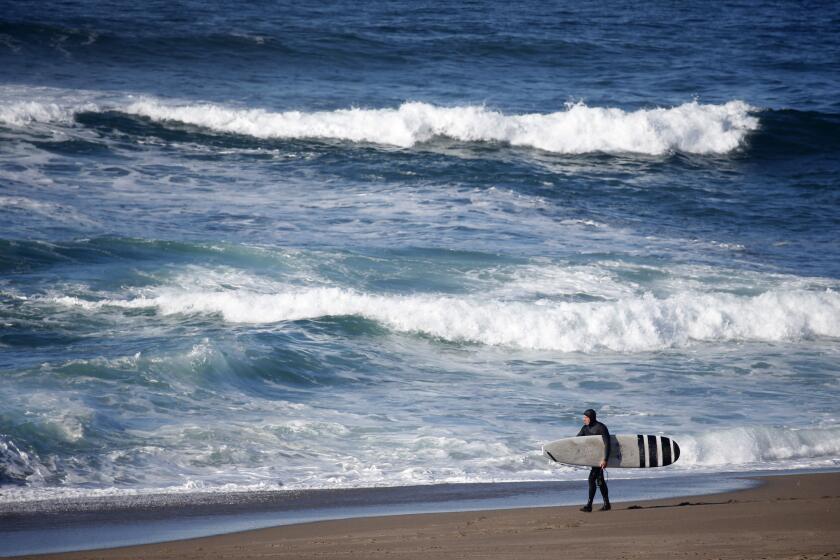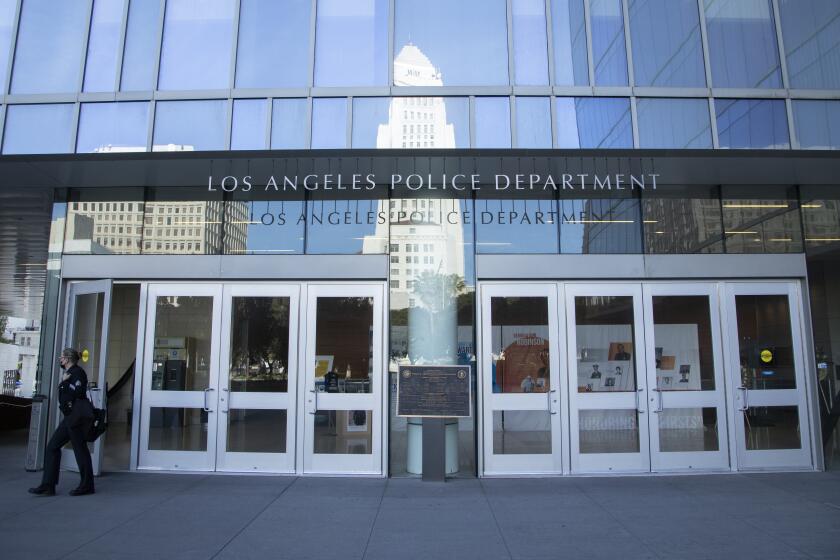State’s Stand on License Plates Gets Hard to Read
The Ronald Reagan library and breast cancer research are on the fast track for their own specialty license plates, but the Girl Scouts and the Rotary Club have been sidelined.
Such is the fickle nature of the state Senate’s policy on special-interest license plates. The Senate made a decision to reject all new requests for specialty plates that raise money for charity, but it hasn’t stuck to that policy.
The result is an inconsistency that has raised hackles in Sacramento, both among those who fear that a rash of plates would confuse police and motorists, and those who think more plates would be a good way to raise charity dollars.
The issue is fairness, said Assemblyman Dick Ackerman (R-Fullerton), whose bill for a special-interest plate for Rotary Club members has hit the wall in the Senate. The Assembly has no policy on the plates.
“You can’t justify having some license plates for certain things and not let others have them too,” Ackerman said.
In 1993, the state began issuing special plates for eight entities, such as Yosemite National Park and the California Arts Council. The Senate in 1994 put a moratorium on additional special plates pending the results of a study. In 1997 it decided to reject further requests. The study concluded that the special plates and their registration stickers were hard for police to read.
“The primary issue is that the plates be readable so we can do our job,” said CHP spokeswoman Nanci Kramer.
And witnesses to accidents and crimes often confused the special plates with out-of-state plates, the study concluded.
After the Senate initiated its policy, its Transportation Committee, in theory anyway, became the graveyard for special plate requests. The committee simply refused to hear them.
That’s how then-Sen. Quentin Kopp (I-San Francisco) ran the committee. Kopp’s successor, Sen. Betty Karnette (D-Long Beach), followed suit this year.
But, perhaps because term limits forced Kopp’s departure from Sacramento, legislators thought there might be a loosening of the reins. So a spate of special license plate bills were introduced this year, mostly in the Assembly.
They were all for good causes, like the Girl Scouts and Boy Scouts, the Ronald Reagan Presidential Library and breast cancer research. Of the nine requests, one for AIDS research has been approved, though not yet issued.
Among the current special plates, Yosemite National Park is the most popular, with 57,360 in circulation. The California Arts Council plates are a close second, with 55,044.
With initial costs ranging from $20 to $50, and higher renewal fees as well, the eight plates in circulation have raised $36.74 million for their causes.
In addition to the special-interest plates, there are 43 “recognition” plates for such groups as ham radio operators, Pearl Harbor survivors--and state legislators. They are not money-makers.
The ubiquitous vanity plates are also considered specialty plates--each approved by the DMV--and have brought in $500 million for state environmental projects.
The DMV charges a processing fee for all specialty plates.
Unlike the upper house, the Assembly had no compunction about approving new plate requests this year.
Ordinarily, the bills would have met a quiet death in the Senate. But no one stayed quiet, least of all Assemblyman Tony Strickland (R-Thousand Oaks), in whose district sits the Reagan Presidential Library.
Denied a hearing by the Senate Transportation Committee, Strickland called a news conference to denounce the rejection, playing on the former president’s popularity.
“If they can name a park in Paris after Ronald Reagan, the least we can do is have a license plate named after him in California,” Strickland said.
Reagan would be the first individual so honored in California.
Karnette and others said former First Lady Nancy Reagan joined the campaign, phoning Sen. Jim Brulte (R-Rancho Cucamonga) for help. The Senate just couldn’t say no to Nancy Reagan.
Soon, Karnette said, she found herself in a meeting with Brulte and Senate President Pro Tem John Burton (D-San Francisco) and she was prevailed upon to make an exception. The Reagan Library plate is eligible to be voted on by the full Senate this week.
The breast cancer plate has its own tale. It was added to Sen. Joe Baca’s (D-Rialto) breast cancer research bill while it was in the Senate Health Committee, which lacks jurisdiction over license plates. The committee and the full Senate passed the measure over Karnette’s opposition. The bill is pending in the Assembly.
As for the other license plate bills, Karnette is adamant that they will not get a hearing. She plans to hold a joint Assembly-Senate hearing during the fall recess to air the license plate issue.
To add yet another wrinkle to the debate, Sen. Steve Peace (D-El Cajon) recently weighed in with a plan to issue new license plates to all registered vehicles.
Noting that the state has not issued all-new license plates since 1963, Peace said a blanket changeover to uniform plates would benefit law enforcement, as scofflaws who failed to register their vehicles with the DMV would be easily identified by their old plates.
(BEGIN TEXT OF INFOBOX / INFOGRAPHIC)
A Smorgasbord of Plates
The state’s eight current special interest car license plates have raised $36.7 million for various charities. A ninth has been approved but not issued yet. The state Legislature, which has blocked approval of new specialty plates, is considering giving several the OK.
Proposed New Plates:
The Ronald Reagan Presidential Library
Breast Cancer
Girl Scouts
Rotary Club
Current Special Interest Plates
Arts
Kids
Coastal Protection
Firefighters
Lake Tahoe
UCLA
Veterans
Yosemite
Source: Department of Motor Vehicles
More to Read
Start your day right
Sign up for Essential California for news, features and recommendations from the L.A. Times and beyond in your inbox six days a week.
You may occasionally receive promotional content from the Los Angeles Times.






